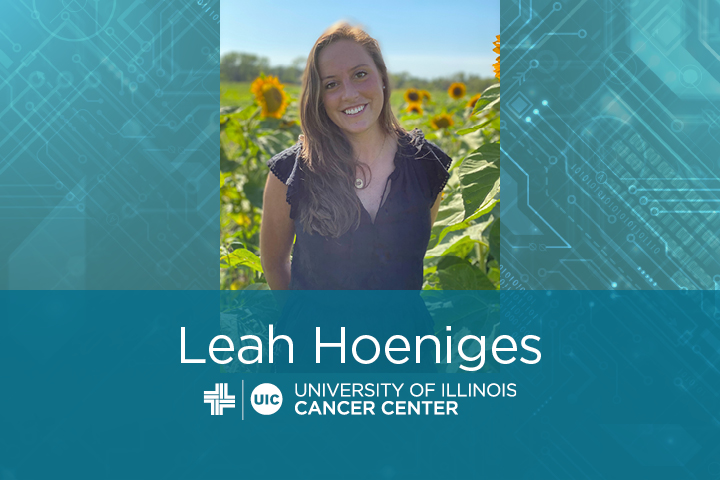
An active woman who enjoys exercise, Leah Hoeniges experienced foot pain so severe in October 2019 she needed crutches to walk. The discomfort alternated between her left and right foot, leaving doctors puzzled. Then, Hoeniges experienced cervical bleeding and learned the problems were related.
“I thought I had two health issues going on, one with my feet and one with my bleeding,” said Hoeniges, a native of Bloomington, Illinois. “I was diagnosed with cervical cancer, and after meeting with a fertility doctor, she suggested I get my legs checked for deep vein thrombosis. Then it all came together.”
The cancer caused blood clots in Hoeniges’ legs.
Prior to her first cancer treatment, Hoeniges gave herself two daily injections of blood thinners to treat the deep vein thrombosis. She also completed an egg retrieval, which required the placement of an Inferior vena cava (IVC) filter, a small device that stops blood clots from going up into the lungs.
Each aspect of her care took a toll, particularly the fertility drugs needed for egg retrieval.
While the cancer treatment caused sleepiness and weakness, Hoeniges’ pain was minimal until the end of therapy. A drop in her white cell count reduced her chemotherapy infusions from two to one. She underwent about 25 radiation treatments over the course of several weeks in February 2020.
“Laying down for fifteen minutes while music plays, with a warm blanket covering you up, was not a bad way to spend an afternoon,” Hoeniges said. “It was when the radiation began affecting my bladder and bowels that it became painful.”
“For a while I thought I might be lucky – I was young and strong – and not experience those side effects. But my radiation oncologist assured me at some point I would, and she was right.”
Hoeniges suffered so much pain going to the bathroom that she began limiting how much she ate and drank. This led to rapid weight loss and dehydration, making it difficult to insert IVs. The final four radiation treatments were “very long and very uncomfortable, but I just kept reminding myself that I was grateful for my youth and strength and I could make it through.”
Cancer forced Hoeniges to place some monumental life events on hold. She attempted to complete the final course in her UIC master’s degree program, but felt distracted and had to finish later. She was also maid of honor in her younger sister’s wedding, and while she was able to participate in all of the pre-marital activities, “I couldn’t be as present and mindful as I wanted to be, or as a maid of honor sister should be.”
The treatments further weakened Hoeniges’ body over the latter months of 2020, limiting her ability to socialize with friends and exercise. Her white blood count dropped to unsafe levels.
Then COVID-19 arrived, triggering terrible anxiety about contracting the virus.
After a painful and difficult year and a half, her mental and physical health are strong. She is cancer free, with a new master’s degree in Public Health from the University of Illinois Chicago. Hoeniges’ career goal is to earn a doctor of nursing practice degree so she can treat oncology patients. She can relate to what they are experiencing.
During a visit with her gynecological oncologist – University of Illinois Cancer Center member Dr. Shannon MacLaughlan – Hoeniges asked when she would feel more like herself. Hoeniges then believed MacLaughlan’s eight to 12 month timeline was conservative, but discovered it was right.
“I realized that who I was before will never be again,” Hoeniges said. “I have gone through something that has changed my life in many ways, some bad and some good. I am more resilient and stronger than I was before and I continue to be grateful for science and the wonderful doctors that saved my life.”
